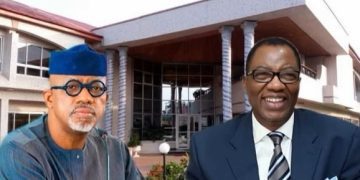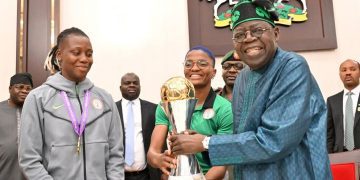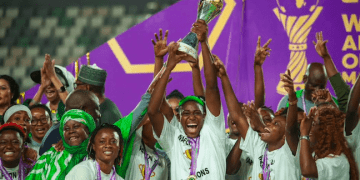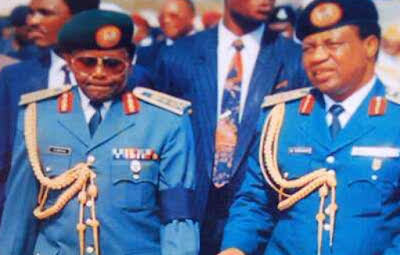By Jane Okafor, Abuja
ABUJA: Former Military President, Ibrahim Babangida has given insight into how his longtime bosom friend and colleague, Gen Sani Abacha, had posed grave risk to his life and the lives of others dear to him(IBB).
Babangida revealed that Abacha planned to violently removed him from power, stressing that the situation at the time was so delicate and complex that if he had dared retired him, the consequences could be dire with the Nigeria army that was factionalised at the time.
He made this known in his book: ‘A Journey in Service’, launched at the Transcorp Hilton Hotel, Abuja yesterday.
The event attracted former presidents, military leaders, and statesmen, captains of industry and diplomats from Nigeria and beyond. He blamed his then Chief of Staff, Abacha, who later toppled the transitional government led by Ernest Shonekan, was opposed to handing over power to civilian administration.
He said: “In this regard, other fundamental questions have arisen in my handling of General Abacha and the June 12 elections. “If, as I said earlier, Abacha was a clog in the wheel of the transition to civil rule process and had plotted to remove me as President violently, why didn’t we retire him to forestall the problems that later emerged?
“Was there a pact between Abacha and me that he would succeed me? Was I afraid of him, fearful for my life? “Why didn’t we ‘neutralise’ the other known opposition forces to the transition process? “Why didn’t we take prompt action against the ABN for interfering with the Transition process, in violation of Decree 19, which made it a criminal offence to hinder the transition?
“The answers to some of these questions are implicit in earlier sections of this chapter. “No, there was no pact between Abacha and me. Yes, there were moments when my safety and the safety of all those dear to me were of concern. But the situation was so unstable that any wrong move on my part could have resulted in bloodletting
“As I stated above, the military was so factionalised that any move against General Abacha at that time would have, to put it mildly, been problematic. “So, I kept hoping (again, naively, it seems now, in retrospect) that Abacha would fall in line and back the transition process. “As humans, we have instincts. But we also have the innate ability to override them.
“In my judgement of Abacha, I allowed my instincts, and painfully so, to take a backseat.” ‘Ikpeme worked in my AGF’s chambers’ Incidentally, the journey to the June 12 annulment began two days before D-Day when a judge granted an injunction stopping the electoral commission from going ahead with the election.
“A group known as the Association to Better Nigeria (ABN), led by Arthur Nzeribe, had filed the lawsuit. Babangida admitted in the memoir, published by Bookcraft Ltd., that Nzeribe was close to him, but denied supporting the activities of ABN.
“From out of nowhere, on June 10, two days before the presidential election, the same shadowy group, ABN, which had been campaigning for an extension of military rule, approached the Abuja High Court of Justice Bassey Ikpeme for an injunction to stop NEC (National Electoral Commission) from conducting the elections,” he said in his biography
“Unknown to me at the time, Justice Ikpeme, who was relatively young at the Bench, had worked in the chambers of the Attorney-General and Minister of Justice, Clement Akpamgbo.
“Strangely, Justice Ikpeme, in the dead of night, in clear violation of Decree 13, which barred any court from interfering with INEC’s conduct or scheduling of the elections, granted the ABN an injunction stopping NEC from conducting the June 12 elections. There was confusion everywhere.”
Meanwhile, Africa’s richest man, Aliko Dangote, used the occasion to pledged t donate N8 billion towards planned presidential library of the former military president, General Ibrahim Babangida, the self – christened ‘evil genius.’
Speaking during the public presentation of IBB’s autobiography and fundraising for his presidential library in Abuja, Dangote said he will be supporting the project with N2 billion annually for a period of four years.
Dangote hailed Babangida’s administration for introducing transformative policies, which he noted encouraged Nigerian investors to drive economic development.
“Your excellency, I could continue to list all the reforms you introduced that liberated the private sector, which is why Nigeria has more private sector involvement than any other country in Africa,” he said.
“It is only in Nigeria where government contribution to GDP is a mere 15 percent, with the remainder being driven by the private sector,” he added while expressing hope that future Nigerian leaders will adopt similar policies for the betterment of the country.
“Your excellency, based on what I have observed, I believe this project will require at least four years to complete. I would like to contribute N2 billion each year for the next four years, amounting to N8 billion in total. Should the project extend beyond four years, I will continue to contribute N2 billion annually.”
Also, Abdul Samad Rabiu, founder of BUA, donated N5 billion to the IBB Libra project.
Theophilus Danjuma, founder of the TY Danjuma Foundation, donated N3 billion; Godswill Akpabio, the senate president, donated N50 million; Arthur Eze pledged N500 million; and Mustafa Chike-Obi of Fidelity Bank gave N100 million.









































